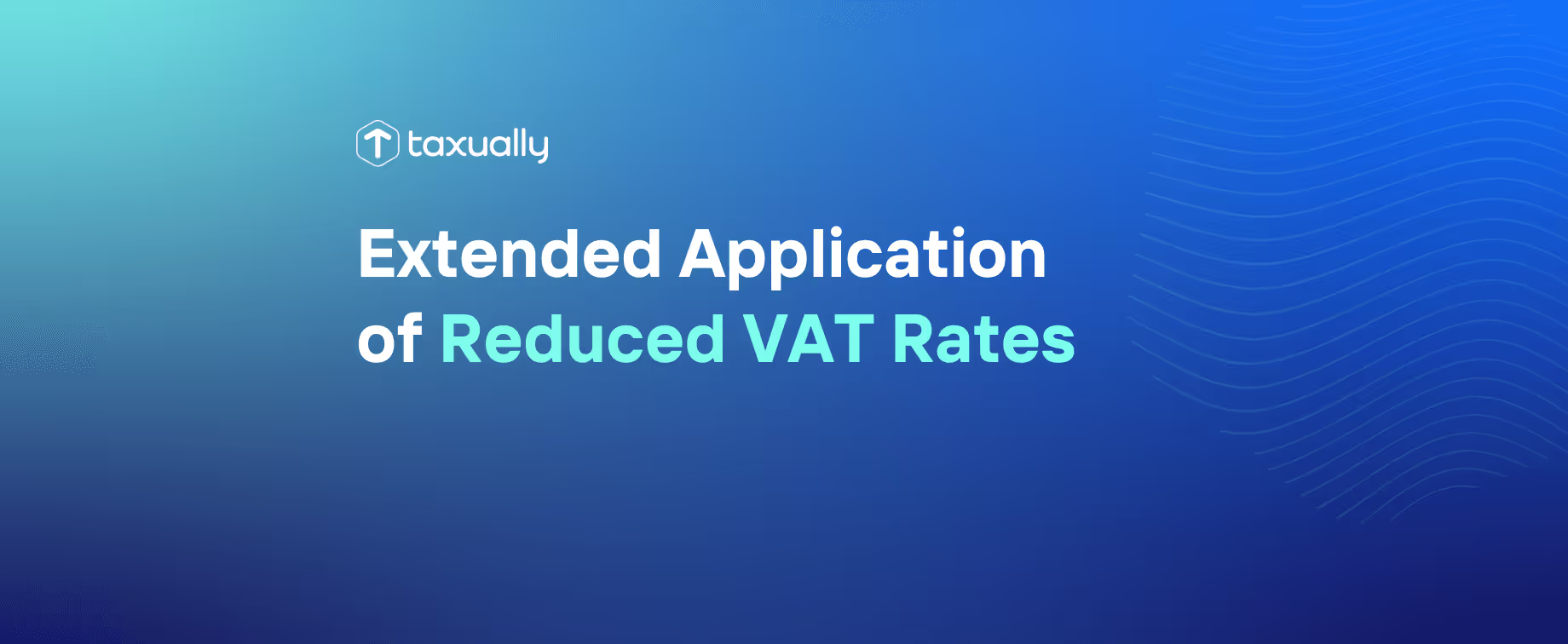Key takeaways
- European VAT relief continues: Many EU countries, including Ireland, Germany, Portugal, and Greece, have extended or introduced reduced VAT rates in 2023 to support sectors hit by inflation, energy costs, and the pandemic.
- Focus on essential goods and sustainability: Several governments have applied zero or reduced VAT rates to essentials such as food, hygiene products, and renewable energy systems like solar panels.
- Businesses must stay compliant: Companies should track VAT rate changes, update their systems promptly, and seek professional advice to ensure compliance with the latest national and EU VAT rules.
The application of reduced VAT rates is regularly subject to intensive debate, especially in Europe. Although there are arguments that the VAT system should be more uniform to enhance economic efficiency and to protect the functioning of the internal market, there are strong arguments for applying and even extending the scope of reduced VAT rates.
When applied purposefully and as an exception, reduced VAT rates can improve efficiency by increasing productivity or by reducing structural unemployment. They can enhance equity by improving income distribution or by making particular products more accessible.
Lately, there is a noticeable trend for governments to reduce, either temporarily or permanently, VAT rates for businesses that have been impacted by the turbulent economic climate, inflation, and the pandemic. Numerous European countries have introduced measures to support businesses in the most affected sectors.
Here we examine the moves that have been made in each of these countries and how businesses affected need to respond to these changes and by when.
Ireland - extended application of reduced VAT rate in tourism and hospitality

The government of Ireland has focused its attention on the hospitality and tourism sectors. As a nation, Ireland has historically had a very strong tourism sector attracting visitors from around the world. However, the pandemic and the recent cost of energy increases have put this sector under immense pressure and many businesses have been forced to close their doors over the last two to three years. The government identified that this is not just a short-term issue but one which could affect the economic health of Ireland for decades to come. To combat this, they have made some changes to Irish VAT.
Ireland has decided to extend the application of the reduced VAT rate of 9% for businesses operating in the hospitality and tourism sectors until the end of August 2023. The plan is to restore the VAT rate for these sectors to its original rate of 13.5% from September 1, 2023.
In addition, the Irish government has announced that the supply and installation of solar panels will be subject to zero VAT from May 1.
Greece - extended application of reduced VAT rates in various sectors
The government of Greece has also decided to extend the temporary reduction in VAT rates for a number of sectors until the end of December 2023.
The rate for non-alcoholic drinks, imports of works of art and supplies of works of art, passenger transport, gyms, dance schools, and entrance for zoos will continue to be 13.5% until the end of 2023.
Additionally, the VAT rate on personal hygiene and protection products, as well as some entertainment venues including cinemas, theatres, and event venues will be kept at 6% until the end of the year.
Portugal - zero VAT on essential foodstuff and extended scope of reduced VAT rate
Portugal is focusing its VAT efforts on a number of essential food products such as fruits, vegetables, oils, and meat. In the period from April 18 to October 31, 2023 supplies of these products will be subject to zero VAT rate.
In addition, the Portuguese government has extended further the scope of products subject to the reduced VAT rate of 6%. These include the following:
- Canned seafood-based products with a fish content of at least 50%.
- Vegetable-based foodstuffs, including oils, drinks, and yoghurts.
- Sale and repair services for bicycles (spare parts are still levied at the higher rate of 23%).
- Tickets for entertainment venues and events.
- Boilers fuelled by biomass products.
- Biomass fuels.
Germany - extended application of reduced VAT rate for gas, heating, and catering; zero VAT for alternative energy sources
Germany's government has taken several decisions recently to support businesses and mitigate the impact of the pandemic and the ongoing economic instability caused by the country’s current energy concerns. These include the following German VAT rate reductions:
- A temporary reduction of VAT levies to 7% on natural gas and biogas via the gas network, as well as heating via the heating network. This was first implemented in October 2022 and will now be extended to March 31, 2024.
- Restaurants and catering services have had the benefit of a reduced VAT rate of 7% since July 2020. This has now been extended to December 31, 2023.
- As part of reducing reliance on foreign energy supplies and to accommodate its commitments made at the recent COP conference, the government has also taken action to support the alternative energy supply market by reducing VAT to 0% on the supply, import, intra-Community acquisition, and installation of certain photovoltaic installations and their components.
Italy - reduced VAT rates for hygiene and baby products
Italy has temporarily reduced VAT rates to 5% on the following products:
- Feminine hygiene products.
- Baby products, including nappies, children’s car seats, and food products for infants and young children.
- Face masks, and PPE designed to mitigate the risks associated with COVID-19.
Lithuania - temporary and permanent reduced VAT rates for e-books, accommodation, catering, and live events
As of January 1, 2023, the government of Lithuania has reduced VAT rates to 9% for various goods and services. It is important to note that some of these changes will be permanent but others will not. Some of the durations of these reductions are yet to be determined and announced. The rate changes include:
- eBooks and electronic non-periodical publications will be subject to 9% instead of the 21%. This will be a permanent VAT rate change.
- Accommodation and admission to artistic and cultural events will be taxed at 9% for an indefinite time. There are exemptions to this rule change so it is best that eligibility is checked on a case-by-case basis.
- Catering and takeaway services will incur 9% VAT until December 31, 2023, however, alcoholic drinks are not included in this reduction.
- Admission to events will be taxed at the 9% rate, but only until June 30, 2023.
Switzerland - reduced VAT rate for hygiene products
Switzerland has also joined the countries with extended scope of the application of reduced VAT rates. Similarly to Italy, the Swiss government has chosen to reduce its VAT rate on feminine hygiene products. The previous rate was 7.7%, and this has been reduced to 2.5%.
Bulgaria - extended application of reduced VAT rate for e-books, baby food, and accommodation

The Bulgarian government has decided to extend the application of the reduced VAT rate of 9% on the following goods and services until the end of December 2023:
- Delivery of electronic books (excluding educational books, children’s books, colouring books, and handwritten music books).
- Periodical newspapers and magazines.
- Baby and infant food, nappies, and hygiene products.
- Leisure accommodation including caravan sites and camping grounds.
Conclusion
With such a dynamic VAT landscape it is imperative that your business keeps up to date with changes occurring in your market and seek professional advice should there be any doubt regarding eligibility for these reduced VAT rates. It is also important that you update your systems once the new rates become effective as well as when the temporary reductions end, so your business is fully compliant with the rules in force.
Frequently asked questions
New Year's Day - 1/1/2024Memorial Day - 5/27/20244th of July - 7/4/2024Labor Day - 9/2/2024Thanksgiving Day - 11/28/2024Day after Thanksgiving - 11/29/2024Christmas Eve - 12/24/2024Christmas Day - 12/25/2024
Which European countries have introduced reduced VAT rates in 2023?
In 2023, several European countries introduced or extended reduced VAT rates, including Ireland, Greece, Portugal, Germany, Italy, Lithuania, Switzerland, and Bulgaria. These measures aim to support sectors affected by inflation, the energy crisis, and the pandemic.
What is the reduced VAT rate for hospitality in Ireland?
Ireland extended its reduced VAT rate of 9% for hospitality and tourism businesses until August 31, 2023. From September 1, 2023, the rate returned to its standard 13.5%.
Which goods in Portugal are now subject to zero VAT?
Portugal introduced a temporary zero VAT rate on essential food items such as fruit, vegetables, meat, oils, and fish from April 18 to October 31, 2023. The country also expanded its 6% reduced VAT rate to include bicycle repairs, canned seafood, and biomass products.
Has Germany extended its VAT reductions for energy and catering?
Yes, Germany’s reduced 7% VAT rate for gas, heating, and catering will remain in effect until at least March 31, 2024. Additionally, photovoltaic systems now qualify for a 0% VAT rate to promote renewable energy use.
Why are European countries reducing VAT rates?
Many governments have lowered VAT rates to stimulate economic recovery, support struggling industries, and reduce the burden of rising costs on consumers. These temporary or permanent VAT changes aim to improve affordability and strengthen key economic sectors.



















